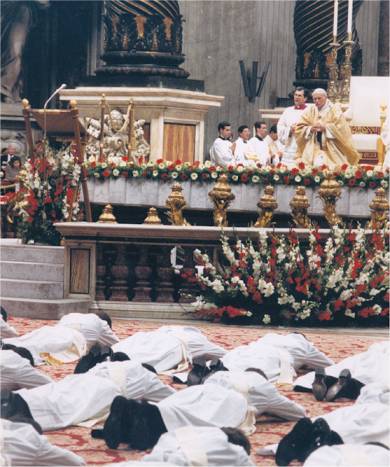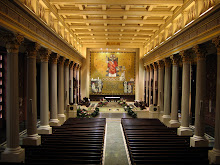Inside Catholic has the first two parts of a multi-week, mutli-column conversation on Clericalism in the Church.
Part 1, On Clericalism, by Russell Shaw has been up for a few days.
Part 2, On Reverse Clericalism, by Todd Aglialore, appeared yesterday.
(It's taken me a couple of days to write this post.)
Of particular note in the second article was this:
Today's clericalists aren't little emperors; they're middle managers. They don't have too much pride in the sacredness of their vocation; they have too little.
Indeed, the root of this kind of clericalism may be the same as the root of the ostensibly anti-clericalist attitudes of some clergy: a crisis of confidence (which may be itself a crisis of faith) in the ineffable wonder, power, and glory of the priesthood.
I felt a slap in the face when I read these two paragraphs. I've encountered this approach, the 'Don't do damage, don't make anyone mad, don't make waves' approach. In a time of increasing secularity in our culture, this approach contributes to the 'silent apostacy' of the faith. By our leaders (which I realize I am squarely in the midst of) approaching true ministry in a management style; we have lost the power and dynamism of the faith. We have lost the zeal that led to the early Christian Martyrs. We have lost that zeal which led Dominic, Francis, Ignatius, Norbert, et al, to ground religious communities which led to renewal and re-invigoration in the Church.
However, the flip side is dangerous as well, which is what Shaw seemed to be critiquing. (Aglialore seems to accuse him of constructing a 'straw man' of the 'Clericalist Priest,' as he is short on anecdotes.) The last thing we need are autocratic, dictatorial priests. This is not in the mold of who Jesus was, or who priests should be.
Yet, there truly is a difference between priests and laity, and this difference cannot be mitigated. It is there whether we want it to be or not. As a priest, I can confect the Eucharist, free others from their sins, baptize, confirm (if necessary and with proper permission). Without priests, these things cease to happen.
At our regional meeting for vocation directors, we discussed these aspects in relationship to religious life. One of the sisters who was present lamented that all the generic (ie, non-community specific) videos and promotions for religious women's communities in particular seem to focus on the 'look at all the great things that we can do as women's religious. I agree, women's religous communities have diversified and are active and present in many realms of the Church and the world.
But the question that elludes them: "What makes you, as a woman religious, different from a regular lay ecclesial minister?" Why should a young woman who wants to serve the Church join you instead just working as a lay minister and still be able to get married and have a family?
Sister's point was that religious communities, in their striving to be like everyone else, lost the sense of community: this is a group of women who have left behind the trappings of this world to come together as one, as brides of Christ, to be living witnesses of the Gospel.
Does this denigrate the lay apostolate in the world? Hardly, because they are different callings! The crisis in both priesthood and religious life is because these two callings have been confused and mishmashed.
The priest remains the Captain of the Ship, but he should also be willing to go down with the ship, too. His first concern is the safety and lives of his crew members: his parishioners.
We need to stop de-clericalizing the priesthood and clericalizing the laity. Our roles are complimentary.
Thursday, May 8, 2008
Clericalism and Anti-Clericalism
Labels:
anti-clericalism,
Clericalism,
laity,
priesthood,
Vocations
Subscribe to:
Post Comments (Atom)










1 comment:
YES! Thank you!
I've seen the "don't make waves" approach too many times, and it frustrates me...it's the reason no one knows, for example, that skipping Mass on Sunday without a really good reason is a grave sin. And other common Catolic things that we should all know. Because no one wants to "make waves" and scare people away.
And sure, there's a certain amount of truth to that, however, now it's time for cleanup. And that's going to continue to be difficult for some people who have adopted the watered-down pick-what-you-want-to believe crap that they've been fed all their lives.
Personally, I'm ONLY inspired by someone who's willing to lay it out there and speak the truth, especially if the truth is difficult. And I like it much better if that person speaking is a priest. (Um...not complaining if the laity do it, they just lack the same authority.) So, yeah...what you're saying.
And of couse, they're right about women religious. I know of a blog by a religious sister who is part of a community...but just barely. She doesn't live with them. She lives by herself. She had to find her own job, she pays her own rent, etc etc. And she prays with them occasionally, apparently. She does not wear a habit.
I ask you...how is that different than being, say, a 3rd Order Dominican? Sure, that's a vocation, but it's a lay vocation. It's not what being a Sister is about.
I simply don't see the point in becoming a religious sister if I'm going to look like the rest of the world, live in a house with a couple other women who look like the rest of the world, and basically just be social workers who from the outside look like a few aging spinsters? Where's the official witness of Jesus Christ in that life?
Granted, many "convents" these days are houses, but there is something about the authentic spirituality of a committed community, with solid connections to their motherhouse and others, following solid traditions, and serving Christ, very clearly, as Sisters...not aging social workers. And of couse I'm not denigrating social work (my background is in that field among others!) It's why I think habits are so important in today's world...it keeps those lines from being blurred. At least, in America.
I coudl say more but I'll stop there. I think you know my opinions on this.
Post a Comment